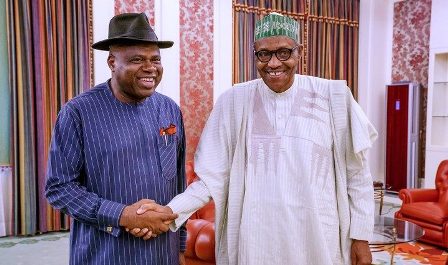Politics
Buhari Meets Diri, Promises To Work For Peace In Bayelsa, N’Delta

President Muhammadu Buhari yesterday met with Bayelsa State Governor, Douye Diri, promising to work for peace in the state in particular and the Niger Delta region in general.
Buhari was meeting Diri officially for the first time since he assumed duty as governor, February 14th.
Recall that the Supreme Court had on February 13th sacked the governor-elect of Bayelsa State, David Lyon, and his Deputy, Biobarakuma Degi-Eremieoyo.
A five-man panel of the apex court led by Justice Mary Peter-Odili ordered the Independent National Electoral Commission to withdraw the Certificate of Return issued to the All Progressives Congress’ candidate as the winner of the November 16, 2019 governorship election in the state.
The apex court ordered INEC to issue a fresh certificate of return to the candidate of the party with the next highest votes and with the required constitutional spread of votes in the results of the election, which are the Peoples Democratic Party.
The court upheld the November 12, 2019 judgment of the Federal High Court in Abuja which had disqualified Degi-Eremienyo in the election for submitting forged certificates to INEC.
The court ruled that Mister Degi-Eremienyo’s disqualification had infected the joint ticket with which he and the governorship candidate, Lyon, ran for and won November 16, 2019.
Speaking to State House Correspondents after the meeting, Diri said he was received like a son.
He said: “It is a private visit. Since I resumed as Governor of Bayelsa State, precisely on the 14th of February, I have not come to see the father of the nation. Today, I just did that, to come and see the father of our country and to work with the Federal Government of Nigeria in ensuring peace and stability in my state and ensuring the development of my state. That is what informed my visit to Mr. President today.”
On how he was received and the promise he made to Bayelsa State, Diri said: “Mr. President received me as one of his sons, as a governor of a state and he received me very warmly. I am very satisfied with the reception.
“As I said earlier, Mr. President received me as one of his sons, as a state governor and the reception was very warm. He went ahead to say that he was happy that I came and that he was happy with the way I have started. He went on to say he has read about all the statements that I have made and the security so far in Bayelsa.
“He promised as one of his sons, a state like Bayelsa that is critical to the security and peace in the Niger Delta, he was prepared to also work with me.”
Politics
Natasha’s Counsel Writes Senate Over Court Judgment
The legal counsel to the Senator representing Kogi Central, Senator Natasha Akpoti-Uduaghan, has faulted the National Assembly’s interpretation of a Federal High Court’s judgment which ordered her reinstatement to the Senate, insisting that the judgment was binding and must be complied with in full.
In a rejoinder dated July 14, and addressed to the Director of Litigation and Counselling, Legal Services Directorate of the National Assembly, Mr Charles Yoila, Sen. Akpoti-Uduaghan’s legal team, led by Mr Michael Numa (SAN), accused the Senate of misinterpreting the decision of the Federal High Court in Suit No: FHC/ABJ/CS/384/2025 — Senator Natasha Akpoti-Uduaghan v. Clerk of National Assembly & 3 Ors.
The lawyers responded to an earlier correspondence from the National Assembly dated the same day, in which the Senate purportedly treated the court’s judgment as advisory. They argued that the enrolled judgment was not suggestive, but declaratory and mandatory in nature.
“The preamble of the enrolled order begins with the words ‘it is hereby ordered’ and proceeds to enumerate 12 distinct and substantive orders,” the letter stated.
“Of particular relevance is Order 12 which directed that the Senate should recall the plaintiff. While the word ‘should’ is used, the context of the full judgment supports a binding construction”, it argued.
The legal team noted that the plaintiff had sought, among other reliefs, an order nullifying the recommendations and findings of the Senate Committee on Ethics, Privileges and Public Petitions, which had led to her suspension. They further referenced that the plaintiff’s application for a mandatory injunction was heard alongside the substantive matter and was incorporated into the composite judgment.
Referencing Order 4 of the enrolled judgment, Mr Numa maintained that the court had adjudged the suspension of Sen. Akpoti-Uduaghan as unconstitutional, excessive, and ultra vires.
He contended that, pursuant to Section 1(3) of the 1999 Constitution (as amended), the Senate’s action was null and void to the extent of its inconsistency with constitutional provisions.
The letter made reference to Section 287(3) of the Constitution, which mandates all authorities and persons to give effect to the decisions of courts. It also invoked Section 318, which defines a court decision to include judgment, decree, order, conviction, sentence, or recommendation.
To reinforce the legal position, the letter cited *Ecobank (Nig.) Ltd v. Tempo Energy (Nig.) Ltd* (2025) 9 NWLR (Pt. 1994) 125 at 144–145, where the Supreme Court held that recommendations arising from adjudicated disputes may constitute binding judicial acts.
“The judgment in this case falls squarely within the definition of enforceable judicial determinations,” Mr Numa argued, urging the Legal Services Directorate to revisit the enrolled order and advise the Senate to comply accordingly.
He emphasised that compliance with the judgment was not optional or discretionary, but a constitutional obligation binding on the Senate under the principle of separation of powers and judicial supremacy.
In a final note, the legal team informed the National Assembly that Sen. Akpoti-Uduaghan intends to resume her legislative duties on July 22, especially in light of the recent passing of former President Muhammadu Buhari, describing the development as a moment of national transition.
The letter concluded with a caution that the embattled senator reserves the right to pursue all legal avenues to enforce her rights should the Senate continue to defy the judgment.
This development sets the tone for a potential legal showdown between the judiciary and the legislature over the enforcement of court orders, especially in politically sensitive matters involving elected representatives.
Politics
Alleged Money Laundering: Fayose Has No Case To Answer, Court Tells EFCC
Justice Chukwujekwu Aneke of the Federal High Court, Ikoyi, Lagos, on Wednesday, discharged and acquitted former Ekiti State Governor, Mr Ayodele Fayose, of all charges bordering on alleged money laundering and theft amounting to N6.9 billion.
The court’s decision followed the judge’s ruling in favour of Mr Fayose’s no case submission, bringing to an end a long running legal battle.
It would be recalled that on May 20, 2025, Justice Aneke had reserved ruling on the no case submission after hearing arguments from Chief Kanu Agabi (SAN), counsel to Mr Fayose (the 1st defendant); Olalekan Ojo (SAN), counsel to the 2nd defendant, Spotless Investment Limited; and Rotimi Jacobs (SAN), representing the Economic and Financial Crimes Commission (EFCC).
Mr Fayose and his company had been re-arraigned on an 11 count charge of money laundering and theft, offences the EFCC alleged took place during his tenure as governor and involved funds linked to the office of the former National Security Adviser (NSA), Col. Sambo Dasuki.
Adopting the no case submission dated July 16, 2025, Chief Agabi argued that the prosecution “failed to establish a prima facie case.”
He told the court, “With due respect, the predicate offences on which these charges are based do not hold water. Criminal breach of trust and conspiracy are distinct, and no co-conspirator was charged alongside the defendant.”
He further noted that Abiodun Agbele, allegedly involved in the offences, was not jointly tried, which he said weakened the prosecution’s case and urged the court to hold that Mr Fayose had no case to answer.
Counsel for the 2nd defendant, Olalekan Ojo (SAN), also adopted a no case submission dated March 21, 2025, pointing out that key evidence by prosecution witnesses had been discredited. He highlighted the testimony of the 13th prosecution witness, former Minister of State for Defence, Senator Musiliu Obanikoro, who admitted there was no communication between Mr Fayose and the then NSA.
However, the EFCC counsel, Mr Rotimi Jacobs (SAN), urged the court to dismiss the no case submissions. Adopting the commission’s counter affidavit and written address dated May 8, 2025, Jacobs argued that the defence failed to explain several suspicious transactions.
Mr Jacobs recalled evidence from EFCC investigator, Mr Abubakar Madaki, who told the court that Mr Fayose used associates to acquire multiple properties in Abuja, Lagos, and abroad—properties those associates later denied owning, but which Mr Fayose claimed in his statements.
“If the money was clean, why not buy the properties in his name?” Mr Jacobs asked.
Mr Jacobs also cited Sen. Obanikoro’s testimony that Mr Fayose requested funds in cash and introduced Mr Agbele to facilitate the handover, stressing that “the defendant has questions to answer.”
Delivering his verdict, Justice Aneke ruled that the EFCC failed to establish any prima facie case against Mr Fayose and could not provide concrete evidence linking him to the alleged crimes.
Politics
Bayelsa APC Hails Late Buhari As Change Agent In Nigerian Politics
The Publicity Secretary of the party, Mr Doifie Buokoribo, noted that in a world where politics is often defined by elitism and standoffishness, the late Buhari stood out as a unique example of a statesman and influencer who was popular with the masses and respected by the elite.
The statement read’s in part: “He was a leader who embodied the values of courage, discipline, integrity, and compassion. Buhari’s commitment to duty and the nation was unwavering, both as a soldier and a politician. He led with a strong sense of responsibility, which prioritised the well-being of the people and the security of the nation.
“He brought to politics a strategic mindset that combined the discipline and nerve of a soldier and the diplomacy of a politician. He determinedly went for the presidency of his country, braving all odds, until victory came his way in 2015.
“It was a sweet victory, one that changed the course of politics in the country, being the first time that an incumbent president would lose to the opposition.
“Buhari contested for the presidency a consecutive four times, in 2003, 2007, 2011, and 2015. He stayed the course until some day came in 2015, when he finally met his goal.”
According to the APC State Publicity Secretary, “Buhari’s quiet strength and unshakeable resolve endeared him to many across social classes. He was a friend of the poor and a rallying point for the elite.”
-
Politics1 hour ago
Bayelsa APC Hails Late Buhari As Change Agent In Nigerian Politics
-
Niger Delta46 mins ago
Police Rescue Kidnap Victim, Recover Pistol In A’Ibom
-

 Business1 hour ago
Business1 hour agoReplace Nipa Palms With Mangroove In Ogoni, Group Urges FG, HYPREP
-
Niger Delta46 mins ago
C’River Hands Over Rubber Plantation to Private Company
-

 Business1 hour ago
Business1 hour agoIndustry Leaders Defend Local Content, … Rally Behind NCDMB
-
Niger Delta46 mins ago
Delta Leverages On Extensive River Networks To Drive Blue Economy
-
Rivers3 hours ago
Macobarb CEO Cries Out, Says No Indigenous Contractor Can Win Case Against NLNG Or Oil Majors in Nigerian Courts …As Justice Nwogu Throws Out Macobarb’s N5.74bn Claim
-
News1 hour ago
PCRC Dismisses Claims Of Police Strike As Fake, Mischievous

